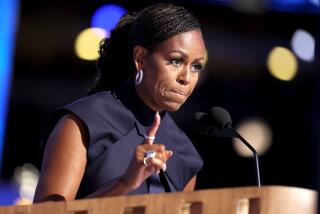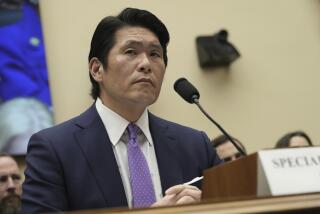Hillary Clinton Defends Past Investments
- Share via
WASHINGTON — In an extraordinary moment of White House drama, Hillary Rodham Clinton on Friday answered and deflected dozens of questions about her finances and her ethics in a 66-minute press conference broadcast live nationwide.
The First Lady, sitting in a Chippendale-style chair beneath a portrait of Abraham Lincoln in the State Dining Room, provided composed and lawyerly answers to a swarm of reporters who demanded to know--with all due deference--whether she and her husband were liars, hypocrites or crooks.
She maintained her innocence and retained her composure through persistent grilling by the White House press corps. She was obviously well prepared for the long-awaited appearance, seeming to know where the land mines were in questions that reporters had been itching to ask for weeks.
But while she appeared to meet each question head on, at the end of the session she had added little to the store of knowledge about the cluster of controversies known collectively as Whitewater.
In a striking series of statements, the First Lady said she believes that she had contributed to public perceptions of wrongdoing in recent months by refusing to answer questions about the Whitewater controversy.
She said that trying to maintain a vestige of privacy and her parents’ counsel to ignore the opinions of others “led me to perhaps be less understanding than I needed to be of both the press’ and the public’s interest, as well as right, to know things about my husband and me.”
The wonder of the occasion was not in the news the First Lady made, but that the event occurred at all.
No First Lady has ever submitted to the kind of rough-and-tumble press conference that Hillary Clinton volunteered for on Friday. Other presidents’ wives have conducted mannered chats with reporters over tea or stepped behind microphones to make pronouncements for children and against drugs.
But Hillary Clinton--who described herself Friday as a “transitional figure” between more traditional First Ladies of the past and a new breed of presidential spouses with independent identities and careers--handled highly specific questions about a series of complex real estate, banking and securities investments that took place while her husband was the governor of Arkansas and she was a partner in a Little Rock law firm.
She took on questions about her hugely profitable foray into the commodities markets in the 1970s, her knowledge of the Whitewater real estate venture’s finances in the 1980s and the state of mind of Deputy White House Counsel Vincent Foster, a close friend of hers who apparently committed suicide last July.
She said she was “extremely comfortable and confident about everything that I have done” during the past 16 years and predicted that the broad Whitewater investigation by special counsel Robert B. Fiske Jr. would vindicate her and the President.
On the chief matters of substance on which she was challenged, the First Lady said:
* She had “absolutely no reason to believe” that she profited from favorable treatment by her advisers when she parlayed a $1,000 stake in the cattle futures market into nearly $100,000 in less than a year.
* She could not remember “any of the details” of how she turned that initial $1,000 investment into $6,300 in her first day of commodities trading.
* That accepting lucrative investment advice from James B. Blair, attorney for Arkansas’ largest employer, Tyson Foods Inc., was not unethical because the Blairs were “among our very best friends.” She denied any impropriety and said there were no favors granted Blair or Tyson Foods in exchange. His profitable counsel was simply “you know, very fortunate for me,” she said.
* She “can’t answer” why she and President Clinton lost considerably less money in the Whitewater real estate project than their putative 50-50 partners, James B. and Susan McDougal. She denied that the McDougals’ greater losses amounted to a “gift” from the owner of a state-regulated thrift to the governor and his wife. She also said she did not know how the Whitewater project’s bills were paid after the Clintons stopped contributing to its accounts.
* She has “no memory” of using her commodities-trading profits to make Whitewater loan payments, thus reducing her tax liability for 1978. She said she got into the Whitewater project to make money, not as a tax dodge.
* She was told nothing in advance by federal regulators or the White House staff about a pending criminal referral on McDougal’s failed savings and loan. The Clintons were named as possible beneficiaries of questionable acts at the thrift, and federal regulators tipped off White House aides about the pending referral.
* She knows nothing about possible shredding of incriminating Whitewater material at the Rose Law Firm in Little Rock, where she and Foster used to practice. She said reports that she and Clinton shredded documents at the governor’s mansion in Little Rock were “absolutely” untrue.
The First Lady admitted that her insistence on a “zone of privacy” around her family and her finances had fueled suspicion that she and the President were covering up scandalous details of their life in Arkansas. But she said she ultimately had come to be “rezoned” into believing that fuller disclosure would ultimately better serve her, her husband and the public.
She said her stiff resistance to the appointment of a Whitewater special counsel and to a full public discussion of the matter for more than four months was “one of the things that I regret most” about the entire affair.
According to aides, the First Lady this week finally came to believe that her silence on the Whitewater controversy was doing the Administration more harm than good, not only on credibility questions but on the White House’s broader agenda, particularly health care reform.
Her staff was ecstatic about what they believed was her adept handling of the questioning, and they expressed belief that the long-dreaded appearance would lay to rest public unease about her role in the Whitewater affair.
The First Lady was also asked whether it was hypocritical for her to decry the greed and financial excess of the 1980s at a time when she was playing the futures markets and investing in speculative real estate ventures. She said it was “a pretty long stretch” between trying to provide a nest egg for one’s family and getting into such things as leveraged buyouts, junk bonds and pension-fund raids.
She said she was raised to believe that “every person had an obligation to take care of themselves and their family.” She said her father “had me reading the stock tables when I was a little girl, and I started doing that with my daughter when she was a little girl.”
“I mean, I don’t think you’ll ever find anything that my husband or I said that in any way condemns the importance of making good investments and saving, or that in any way undermines what is the heart and soul of the American economy, which is risk-taking and investing in the future,” she said.
She grew pensive in discussing Foster’s death, expressing regret that she hadn’t spoken with him for more than three weeks before his death. She said she has often relived the days and weeks leading up to his death and wondered whether if she had called him she might have “picked up a clue.”
Near the end of the press conference, a reporter posed a question that had been asked of the President during a town meeting in North Carolina two weeks ago: “How you can earn our trust back?”
The First Lady said that much of the uneasiness concerning her and her husband arises from the fact that they don’t fit “pre-existing categories” of what a President and First Lady should be.
She suggested that she may be the victim of bias against accomplished, outspoken and independent women.
She said: “You know, I came to this role having worked my entire life. I mean, I started working in the summers when I was 13. I always worked. I worked through college. I worked through law school. That’s what I did. And after I married I continued to work. And after my daughter was born, with the exception of the four months I took off for maternity leave, I worked.
“And I think that, having been independent, having made decisions, it’s a little difficult for us as a country, maybe, to make the transition of having a woman like many of the women in this room sitting in this house. So I think that the standards and, to some extent, . . . the expectations and the demands have changed, and I’m trying to find my way through it and trying to figure out how best to be true to myself and how to fulfill my responsibilities to my husband and my daughter and the country.”
* RELATED STORY, EXCERPTS: A26, A27
More to Read
Get the L.A. Times Politics newsletter
Deeply reported insights into legislation, politics and policy from Sacramento, Washington and beyond. In your inbox twice per week.
You may occasionally receive promotional content from the Los Angeles Times.










